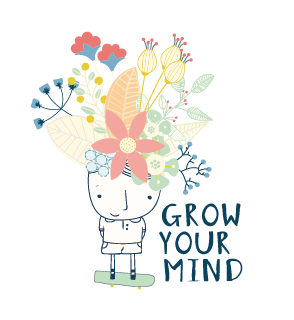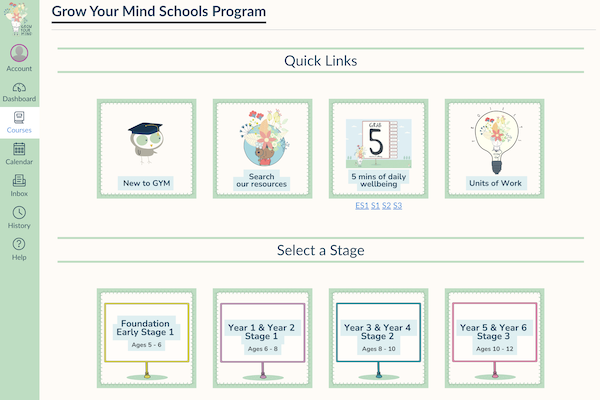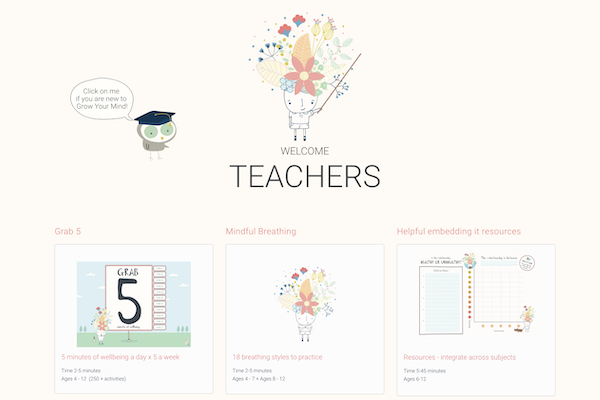by Alice Peel November 23, 2020
LOVE?
NO!
(although we are fans of the stuff)
MONEY
NO!
(also fans)
STAFF WELLBEING?
YES!
You can stop reading now.
Still here? Need more convincing? Here you go:
Even the greatest student wellbeing program on the planet (clearly that being Grow Your Mind) will suffer without effective staff wellbeing. This is NOT just a Grow Your Mind hypothesis. Research highlights that when teachers burn out or experience high levels of toxic stress there are detrimental effects on student learning such as:
- Less engagement with learning and lower overall performance (Collie, Shapka & Perry, 2012)
- Higher levels of stress (contagion) and therefore increased risk of mental health disorders (Oberle & Schonert Reichl 2016)
- Less trusting student-teacher relationships (Yoon, 2002)
Under a new plan from the NSW government, 50 of the 100 accredited hours teachers are required to do each year, will cover four priority areas. One of these will be mental health and wellbeing.
Sounds of applause from our Grow Your Mind corner can be heard, followed quickly by 3 big questions:
Will there be an adequate increase in school counsellors provided to schools to meet the needs of more students being potentially picked up as requiring additional mental health support?
Will schools be alerted to the research that staff must prioritise their own wellbeing if they are to be of benefit to their students?
And finally –
Will these recognised hours include educating teachers about what mental health means? That it is not just the absence or presence of ill health. That in fact, we all have mental health and therefore we can all learn to nurture and protect it.
We are SUPER passionate about educating staff, the community and primary school students about what mental health is. Our resources are effective, engaging and playful. After all, poor mental health is indeed a serious issue but mental health education does not have to be.
The problem is, teachers and school staff regularly put other people’s mental health and wellbeing needs ahead of their own. However, this is a ticking emotional time bomb. Teachers report the highest level of occupational stress in Australia, the United Kingdom and America (Bailey, 2013; Education, 2014; Milburn, 2011). A burnt out, stressed or overwhelmed teacher is going to struggle to convince an 8 year old to nurture their own wellbeing. And what’s more, they won’t have capacity to meet the demands of thousands of interpersonal connections throughout the day as well as their usual work load.
This is why we have made creating staff wellbeing courses a priority. Teachers across the world have taken part in our online and face to face teacher wellbeing courses. Whether that be our:

Or our

It is why a core part of our Grow Your Mind Schools Program resource involves teacher wellbeing. Yes, the majority of what you will find in there will provide students with engaging emotional wellbeing tools, units of work, connection activities, character strength education videos AND a plethora of ways to boost student wellbeing. However, we have placed a huge focus on teacher wellbeing within this resource as well.


Mental health education must be a whole of school approach: this means that the school itself recognises that all aspects of the school community can impact positively upon students’ health, safety and wellbeing. This ALSO means that staff wellbeing is a priority.
So if you could peek into a gold standard example of effective whole school mental health education, what would it really look like in your primary school? To answer this, we encourage you to put on a Grow Your Mind lens:
As you stared into the school gates you would notice that the majority of students, staff and the parent body could tell you that there are many ways to take care of your mental health. An example of this might be that a student decides that mindful breathing is a way for them to emotionally regulate OR perhaps they detest doing anything mindful and instead, the way for them to feel less stressed and more optimistic is by moving their body. A parent would be able to tell you that on the weekend they filled their cup by spending time with feel good friends. Staff members would be committed to doing things that bring them joy both inside and outside of the classroom. Too often when we ask this question in our staff wellbeing courses :
“What do you do that brings you joy?”
It is met with a pause, followed closely by
“When I have the time I…”
Well, in our land of highly effective mental health education, staff members know they cannot afford NOT to prioritise their own wellbeing, starting with doing things that bring them joy.

If you were a fly on the wall in a Grow Your Mind classroom you would immediately see that this is a school that prioritises character strength education. Students from kindergarten and up would be learning what character strengths are, how to spot them in others, in the pages of books and within themselves. You would quickly see that alongside learning to adopt a growth mindset, students and teachers would be learning about what a benefit mindset is and the fact that when we think of others and actively help them we are not only performing a kindness to them, we are also building our own capacity to be resilient.
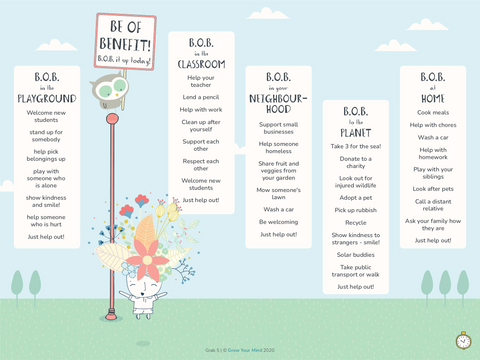
You would see physical and digital resources that encourage children to be aware of the good things in their lives and to adopt a gratitude practice that felt authentic to them. You would hear children being able to identify what a respectful relationship is as well as feeling confident to read the signs that a friendship is no longer healthy. You may see school staff talking about their own personal values and how these shape their decisions throughout the day. Parents themselves would receive information and be asked to participate in webinars about multiple positive health topics.
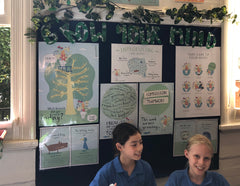
All of them, young and old (er) would know about the key parts of the brain and have an awareness of ways to promote good brain health. Even your 5 year olds might tell you about their Guard Dog, the amygdala, who sometimes mistakes every day setbacks or sadness as a BIG threat. Your older students might share with you some information about their Wise Owl, the prefrontal cortex, and the ways they plan to wake it up that day. Emotional literacy would be growing with every year they are at school. This might look like students being able to name their feelings accurately as well as members of the school community having an understanding, that all feelings are welcome. However, not all reactions are!
Finally, everyone would know that student wellbeing in not a spectator sport.
* Still too busy to prioritise staff wellbeing or perhaps full of regret that you have already booked in your staff development days for 2021?! Fear not, invest in our pre recorded teacher wellbeing courses and you and your staff can complete it at a time that suits them.

